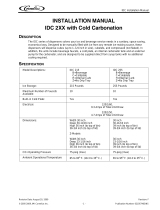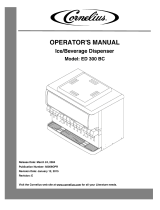Page is loading ...

In accordance with our policy of continuous product development and improvement,
this information is subject to change at any time without notice.
EI203993 Revision B (KAK) 7 June, 2001
Manitowoc Beverage Equipment
2100 Future Drive Sellersburg, IN 47172-1868
Tel: 812.246.7000, 800.367.4233 Fax: 812.246.9922
www.manitowocbeverage.com
Foodservice Group
Multiplex Beverage Equipment Installation Instructions for
Drain Assembly Repair Kit for Dispensing Towers
P.N. 00203993
Side Drain
Bottom Drain
Install drain assembly repair kit as shown in figure 1 and 2.
Caution: To Avoid Serious Injury
Important: Read the following warnings before beginning an
installation. Failure to do so may result in possible death or
serious injury.
DO Adhere to all National and Local Plumbing and Elec-
trical Safety Codes.
DO Turn “off” incoming electrical service switches
when servicing, installing, or repairing equipment.
DO Check that all flare fittings on the carbonation
tank(s) are tight. This check should be performed
with a wrench to ensure a quality seal.
DO Inspect pressure on Regulators before starting up
equipment.
DO Protect eyes when working around refrigerants.
DO Use caution when handling metal surface edges of
all equipment.
DO Handle CO
2 cylinders and gauges with care. Secure
cylinders properly against abrasion.
DO Store CO
2 cylinder(s) in well ventilated areas.
DO NOT Throw or drop a CO
2 cylinder. Secure the cylinder(s)
in an upright position with a chain.
DO NOT Connect the CO
2 cylinder(s) directly to the product
container. Doing so will result in an explosion caus-
ing possible death or injury. Best to connect the
CO
2 cylinder(s) to a regulator(s).
DO NOT Store CO
2 cylinders in temperature above 125°F
(51.7°C) near furnaces, radiator or sources of heat.
DO NOT Release CO
2 gas from old cylinder.
DO NOT Touch Refrigeration lines inside units, some may
exceed temperatures of 200°F (93.3°C).
Notice: Water pipe connections and fixtures directly connected
to a potable water supply shall be sized, installed and
maintained in accordance with Federal, State, and Local codes.
Figure 2Figure 1
Do not over tighten.
Tighten nut until
O-rings start to
compress and turn nut
one (1) full turn.
Do not over tighten.
Tighten nut until
O-rings start to
compress and turn nut
one (1) full turn.
/







